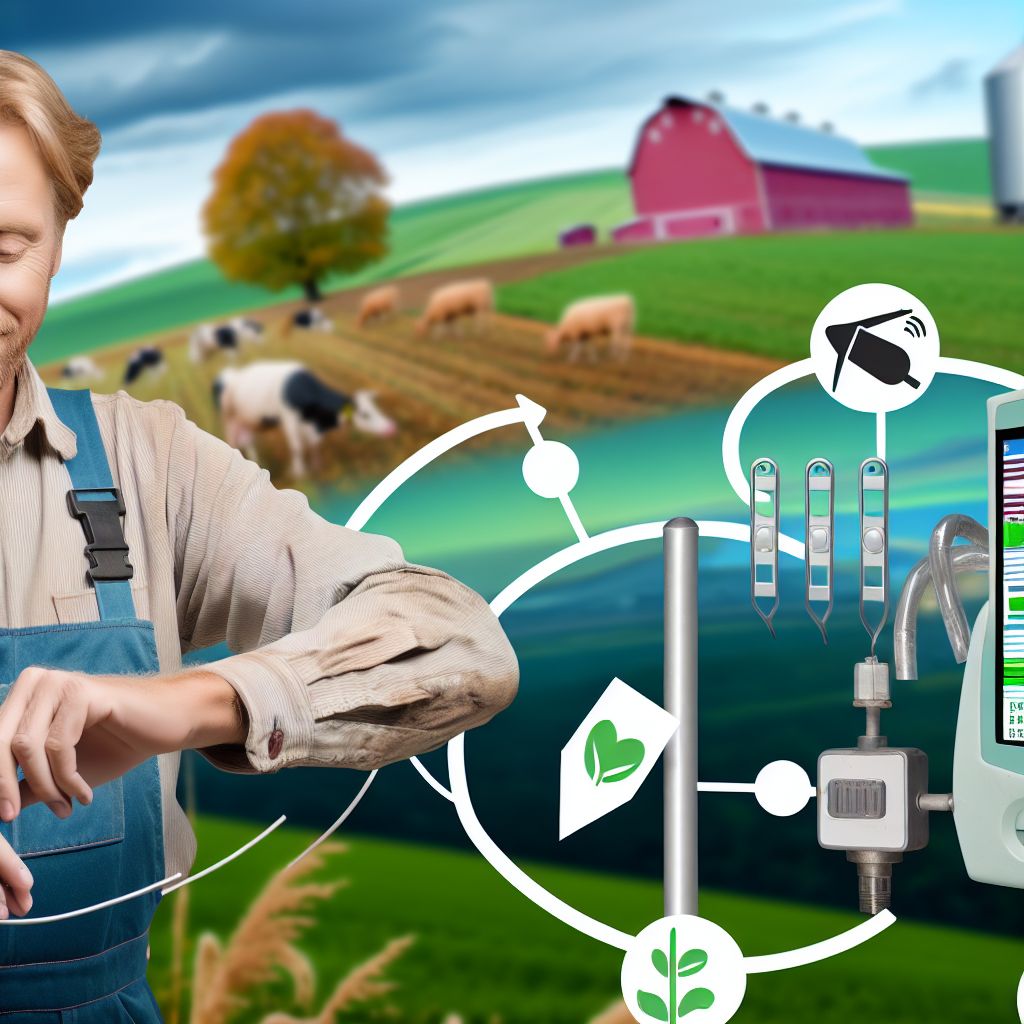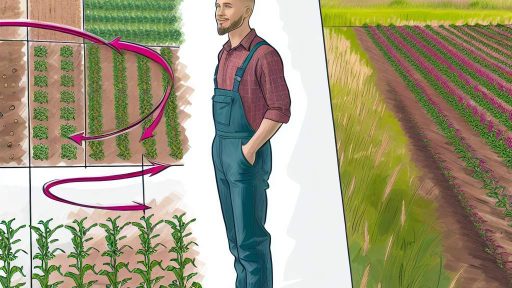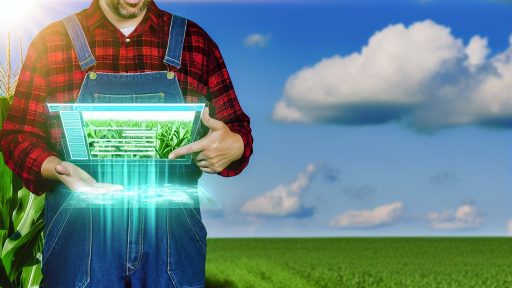Overview of Food Safety Standards and Regulations in Agriculture
Importance of Food Safety Standards
Food safety standards ensure the protection of public health.
These standards govern the production and distribution of food products.
Farmers must comply with these regulations to enter markets.
Additionally, they help consumers trust the food supply.
Key Regulations in Agriculture
Regulations vary by country, each having unique requirements.
The Food Safety Modernization Act (FSMA) is significant in the U.S.
This act emphasizes preventive measures in food safety.
Similarly, the European Union has strict regulations for food safety.
Traceability Systems and Compliance
Traceability systems play a crucial role in meeting these standards.
They help track food products from farm to table.
Through this process, farmers can ensure compliance with safety regulations.
Benefits of Compliance with Safety Standards
Compliance brings multiple benefits for farmers and consumers alike.
First, it reduces the risk of foodborne illnesses.
Second, it enhances market access for farmers.
Moreover, compliant operations can lead to increased consumer loyalty.
Transform Your Agribusiness
Unlock your farm's potential with expert advice tailored to your needs. Get actionable steps that drive real results.
Get StartedChallenges in Meeting Standards
Farmers often face challenges in meeting food safety standards.
Understanding complex regulations can be daunting.
Moreover, implementing traceability systems may require significant investment.
However, the long-term benefits often outweigh these challenges.
The Role of Traceability Systems in Food Supply Chains
Enhancing Food Safety
Traceability systems bolster food safety through better tracking of products.
Farmers can identify the sources of contamination quickly.
This process minimizes risks and protects consumer health.
Moreover, efficient tracking helps in managing recalls effectively.
Building Consumer Trust
Transparency in food sourcing cultivates consumer trust.
Producers who utilize traceability demonstrate commitment to food safety.
This credibility encourages consumer loyalty over time.
As a result, customers are more likely to choose traceable products.
Compliance with Regulations
Traceability systems enable farmers to meet legal food safety standards.
Governments increasingly require documentation of food sources.
This compliance reduces the risk of legal penalties.
Additionally, it ensures smooth trade within the food supply chain.
Streamlining Supply Chain Operations
Traceability simplifies operations across the supply chain.
Farmers can manage inventory more efficiently using data insights.
This improvement leads to waste reduction and cost savings.
Furthermore, it enhances collaboration among producers and distributors.
Responding to Market Demands
Traceability systems help farmers adapt to changing market demands.
Producers can quickly pivot to meet consumer preferences.
For instance, trends towards organic and local foods gain support.
This flexibility leads to better market positioning and profitability.
Showcase Your Farming Business
Publish your professional farming services profile on our blog for a one-time fee of $200 and reach a dedicated audience of farmers and agribusiness owners.
Publish Your ProfileHow Traceability Systems Enhance Transparency and Accountability for Farmers
Understanding Traceability Systems
Traceability systems play a crucial role in modern agriculture.
They help farmers track the journey of their products.
This process starts from farm to table.
Consequently, traceability enhances the transparency of food sources.
Improving Food Safety Standards
Traceability aids farmers in complying with food safety regulations.
It ensures that every step of production is documented.
Thus, any potential food safety issue can be quickly identified.
Moreover, farmers can respond swiftly to any safety concerns.
Boosting Consumer Confidence
Transparency in the food supply chain builds consumer trust.
Customers appreciate knowing where their food comes from.
With traceability, farmers can provide proof of quality and safety.
This transparency often leads to increased sales and loyalty.
Facilitating Accountability
Traceability systems hold all parties accountable in the supply chain.
They track every transaction and movement of goods.
As a result, responsibility is clear during audits or inspections.
Farmers can easily provide records to regulatory bodies.
Leveraging Technology for Better Tracking
Modern technology enhances traceability efforts significantly.
Farmers use software tools to streamline data collection.
These tools enable real-time tracking of agricultural products.
Additionally, they simplify compliance with safety standards.
Encouraging Sustainable Practices
Traceability promotes sustainable farming practices.
Farmers can monitor their inputs and outputs effectively.
Furthermore, they can adjust farming methods based on data analysis.
This leads to smarter resource management over time.
Gain More Insights: Food Waste Reduction Guidelines for Farm-to-Market Producers
Benefits of Traceability for Tracking Inputs and Outputs on the Farm
Enhancing Input Management
Traceability systems allow farmers to manage inputs efficiently.
Farmers can track seeds, fertilizers, and chemicals used.
With clear records, farmers avoid over-application of inputs.
This approach minimizes waste and enhances crop health.
Moreover, it allows producers to comply with safety regulations.
Improving Output Monitoring
Tracking outputs is equally important for farm success.
Farmers can record yields accurately during harvest.
Real-time data helps in understanding crop performance.
This insight assists in making informed decisions for next seasons.
Furthermore, it enables better forecasting and planning.
Facilitating Compliance with Food Safety Standards
Compliance with regulations is crucial for market access.
Traceability systems simplify record-keeping for audits.
Farmers can easily present information on inputs and outputs.
This transparency enhances consumer trust in agricultural products.
Consequently, farms can ensure safer food supplies.
Showcase Your Farming Business
Publish your professional farming services profile on our blog for a one-time fee of $200 and reach a dedicated audience of farmers and agribusiness owners.
Publish Your ProfileSupporting Risk Management
Traceability aids in identifying risks early on.
By tracking inputs, farmers can pinpoint problems rapidly.
This proactive approach minimizes damage and losses.
Additionally, it helps in managing recalls efficiently.
Doing so protects both the farm’s reputation and consumer health.
Building Stronger Market Relationships
Traceability fosters transparency between farmers and buyers.
Retailers prefer working with farms that have robust systems.
This preference leads to stronger partnerships and better prices.
Trust is essential for long-term business success.
Traceability systems are vital for modern farming.
See Related Content: How Farm-To-Table Pop-Ups Strengthen Rural Farming Economies Across The USA
Case Studies of Successful Traceability Implementations in Agriculture
Traceability in Organic Farming
GreenEarth Farms implemented a traceability system to track organic produce.
This system allowed them to monitor each step from farm to consumer.
As a result, they improved transparency and trust with customers.
Customers appreciated knowing the origin of their food.
Consequently, sales increased by 30% over two seasons.
Meat Processing Innovations
FarmFresh Meats adopted blockchain technology for meat traceability.
This technology tracks animals from farm to processing facility.
It ensures compliance with food safety regulations more efficiently.
The company reduced food safety violations by 50% after implementation.
Moreover, this traceability boosts consumer confidence in their products.
Dairy Industry Advancements
Happy Cows Dairy has utilized RFID tags on their livestock.
This approach enables real-time tracking of milk production and health.
As a consequence, they can quickly identify issues in the supply chain.
This system improved milk quality and reduced spoilage significantly.
Thus, the company enhanced its reputation among local retailers.
Fruit and Vegetable Supply Chain Management
BrightBounty Farms introduced a digital traceability platform.
This platform connects farmers, distributors, and retailers effectively.
Through this integration, they ensured timely distribution of fresh produce.
Consequently, wastage decreased by 25% within the first year.
Consumers benefited from fresher produce with longer shelf lives.
The Impact of Traceability on Food Safety Compliance
Case studies show traceability helps organizations meet safety standards.
These systems quickly identify sources during foodborne illness outbreaks.
Additionally, stakeholders can address problems before they escalate.
This proactive approach minimizes risks to public health and safety.
Thus, traceability contributes to a safer food supply chain overall.
Uncover the Details: Biodiversity in Farming for Agroforestry Integration

Challenges Farmers Face in Implementing Traceability Systems
High Initial Costs
Implementing traceability systems often demands significant upfront investments.
Farmers must purchase software, hardware, and training resources.
Consequently, small-scale farmers may struggle to afford these expenses.
Showcase Your Farming Business
Publish your professional farming services profile on our blog for a one-time fee of $200 and reach a dedicated audience of farmers and agribusiness owners.
Publish Your ProfileComplexity of the Systems
Many traceability systems are inherently complex and challenging to operate.
Farmers often require training to effectively use these systems.
Without adequate knowledge, they may inadvertently make errors.
Lack of Standardization
Currently, there is no universal standard for traceability systems.
This makes it difficult for farmers to choose the right solution.
Moreover, varying standards can lead to interoperability issues.
Resistance to Change
Farmers traditionally rely on established methods for operations.
Transitioning to new technologies can create resistance among some farmers.
Fears about the effectiveness of new systems may hinder adoption.
Data Management Issues
Managing the substantial amounts of data generated poses a significant challenge.
Farmers need resources to store, process, and analyze their data securely.
Inadequate data management can lead to compliance failures.
Regulatory Challenges
Farmers must navigate complex regulations about food safety and traceability.
Frequently changing regulations can create confusion within the industry.
Staying updated requires ongoing effort and resources.
Explore Further: Farm-to-Restaurant Programs for Heirloom and Heritage Crops
Technologies and Tools Used in Agricultural Traceability Systems
Integrating Smart Technology
Smart technology revolutionizes agricultural traceability.
Farmers utilize Internet of Things (IoT) devices extensively.
These devices monitor crops and livestock in real-time.
Additionally, sensors track environmental conditions effectively.
Data collected can enhance decision-making processes.
Utilizing Blockchain for Transparency
Blockchain technology offers unparalleled traceability.
It records every transaction securely andimmutably.
Farmers can trace their products from farm to table.
Consequently, consumers gain confidence in food safety.
This transparency helps build strong brand loyalty.
Mobile Applications for Farm Management
Mobile applications aid in efficient farm management.
Farmers can record data using their smartphones easily.
These apps offer features such as inventory tracking.
In addition, they provide reminders for critical tasks.
Moreover, farmers can communicate with supply chain partners.
Cloud-Based Data Storage Solutions
Cloud storage solutions enhance data accessibility.
Farmers can access their data anytime, anywhere.
This flexibility supports collaborative decision-making.
It allows for real-time updates on crop conditions.
Furthermore, data analysis becomes more robust and comprehensive.
RFID and Barcode Technologies
RFID and barcode technologies streamline tracking processes.
They automate the identification of products quickly.
Farmers can monitor inventory levels accurately.
This technology significantly reduces human errors.
Showcase Your Farming Business
Publish your professional farming services profile on our blog for a one-time fee of $200 and reach a dedicated audience of farmers and agribusiness owners.
Publish Your ProfileIn turn, it improves overall operational efficiency.
GPS and Geographic Information Systems
GPS technology aids in mapping and surveying fields.
Farmers can optimize planting and harvesting schedules.
Geographic Information Systems (GIS) facilitate data analysis.
These systems provide insights into soil health and crop performance.
This information enables precision agriculture practices.
Future Trends in Traceability Systems and Their Impact on Food Safety
Adoption of Blockchain Technology
Blockchain technology improves the integrity of traceability systems.
This technology enhances data security and transparency.
Farmers can track the journey of their products more accurately.
Consequently, consumers gain more confidence in food safety.
Integration of IoT Devices
The Internet of Things (IoT) enhances real-time tracking in agriculture.
IoT devices collect data on environmental conditions during transport.
Moreover, this data helps farmers make informed decisions.
Real-time insights reduce contamination risks significantly.
Enhanced Regulatory Compliance
Growers face increasing pressure to meet regulatory standards.
Advanced traceability systems simplify compliance tracking.
They facilitate quick access to necessary documentation.
As a result, farmers can respond swiftly during audits.
Consumer Demand for Transparency
Today’s consumers prefer food products with detailed traceability.
This demand pushes farmers to adopt advanced systems.
Enhanced transparency helps build trust in the food supply chain.
Additionally, it allows farmers to differentiate their products.
Collaboration Across the Supply Chain
Traceability systems encourage collaboration among stakeholders.
Farmers, distributors, and retailers share crucial data seamlessly.
Such collaboration strengthens food safety measures across the board.
Furthermore, it enhances the overall efficiency of the supply chain.
Data Analytics for Predictive Insights
Data analytics tools provide predictive insights into potential risks.
Farmers can identify vulnerabilities before they become issues.
By analyzing trends, they optimize their production and distribution.
This proactive approach enhances food safety standards substantially.
Additional Resources
Partnerships for Climate-Smart Commodities Project Summaries …
USDA Agri-Food Supply Chain Assessment: Program and Policy …




